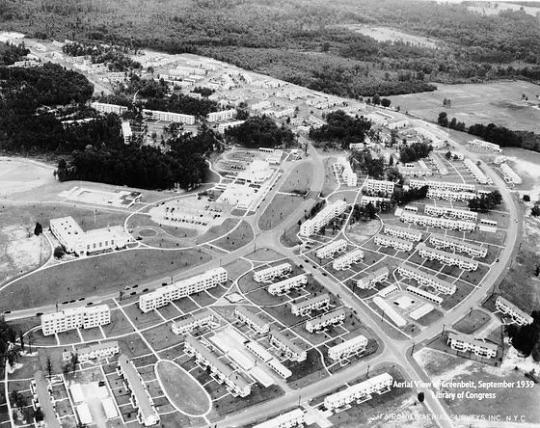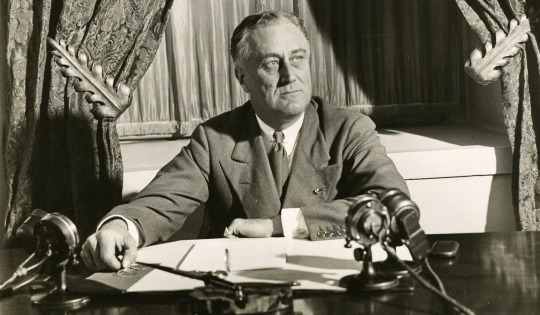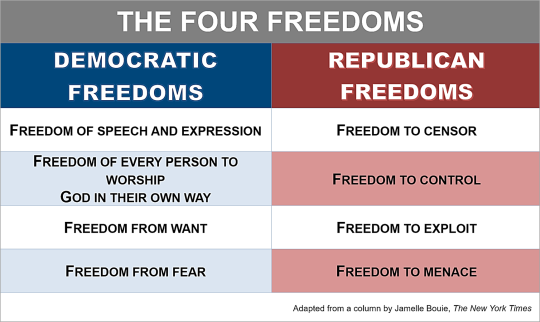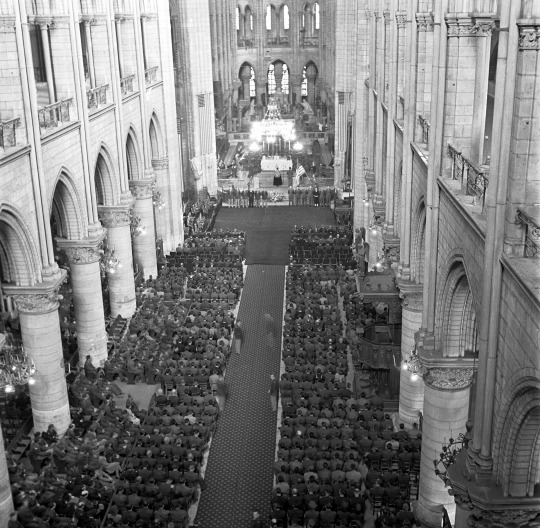#Franklin Roosevelt
Explore tagged Tumblr posts
Text
Greenbelt Maryland. Or, how America almost solved housing only to abandon it.

**I AM NOT AN EXPERT! I AM JUST AN ENTHUSIST! DO NOT TREAT MY OPINIONS/SPECULATION AS EDUCATION!**
During the Depression America faced a housing crisis that rhymes with but differs from our own. It’s different in that there wasn’t a supply issue, there were loads of houses in very desirable areas, but they were still unaffordable as people’s incomes collapsed causing a deflationary spiral. While the housing supply subtly grew and succeeded demand, people simply couldn’t pay the meager rents and mortgages. Herbert Hoover failed to manage the Depression, while his inaction is greatly exaggerated, his policy of boosting the economy with works projects and protecting banks from runs failed and the depression only got more pronounced in his term. In comes Franklin Roosevelt, a progressive liberal much like his distant and popular cousin/uncle-in-law Teddy. Franklin’s plan was to create a large safety net for people to be able to be economically viable even if they’re otherwise poor. These reforms are called the New Deal and they did many controversial things like giving disabled and retired people welfare, giving farmers conditioned subsidies to manipulate the price of food, a works program to build/rebuild vital infrastructure, etc. One of these programs was the USHA (a predecessor of America’s HUD), an agency created to build and maintain public housing projects with the goal of creating neighborhoods with artificially affordable rents so people who work low-wage jobs or rely on welfare can be housed.
In this spirit, the agency started experimenting with new and hopefully efficient housing blueprints and layouts. If you ever see very large apartment towers or antiquated brick low-rise townhouses in America, they might be these. The USHA bought land in many large and medium-sized cities to build “house-in-park” style apartments, which is what they sound like. Putting apartment buildings inside green spaces so residents can be surrounded by greenery and ideally peacefully coexist. Three entire towns were built with these ideas outside three medium-sized cities that were hit hard by the depression; Greenbelt outside DC, Greenhills outside Cincinnati, and Greendale outside Milwaukee. The idea was to move people out of these crowded cities into these more sustainable and idyllic towns. There were many catches though, the USHA planned for these towns to be all-white, they used to inspect the houses for cleanliness, they required residents to be employed or on Social Security (which basically meant retired or disabled), they also had an income limit and if your income exceeded that limit you were given a two-month eviction notice, and you were expected to attend town meetings at least monthly. While the towns didn’t have religious requirements they did only build protestant churches. Which is an example of discrimination by omission. While a Catholic, Jew, Muslim, etc could in theory move into town they also couldn’t go to a Catholic church, synagogue, or Islamic center without having to extensively travel. Things planned communities leave out might indicate what kind of people planned communities want to leave out. Basically, the whole thing was an experiment in moving Americans into small direct-democracy suburbs as opposed to the then-current system of crowded cities and isolated farm/mine towns. This type of design wasn’t without precedent, there were famously company towns like Gary and Pullman which both existed outside Chicago. But those lacked the autonomy and democracy some USHA apparatchiks desired.
The green cities were a series of low-rise apartments housing over a hundred people each, they were short walks from a parking lot and roads, and walking paths directly and conveniently led residents to the town center which had amenities and a shopping district. Greenbelt in particular is famous for its art deco shopping complex, basically an early mall where business owners would open stores for the townspeople. These businesses were stuck being small, given the income requirements, but it was encouraged for locals to open a business to prove their entrepreneurial spirit. Because city affairs were elected at town meetings the city was able to pull resources to eventually build their own amenities the USHA didn’t originally plan for like a public swimming pool or better negotiated garbage collection.
These three cities were regarded as a success by the USHA until World War II happened and suddenly they showed flaws given the shift in focus. These towns housed poor people who barely if at all could afford a car, so semi-isolated towns outside the city became redundant and pointless. The USHA also had to keep raising the income requirement since the war saw a spike in well-paying jobs which made the town unsustainable otherwise. During the war and subsequent welfare programs to help veterans, these green cities became de facto retirement and single-mother communities for a few years as most able-bodied men were drafted or volunteered. Eventually, the USDA would make the towns independent, after the war they raised the income limit yet again and slowly the towns repopulated. As cars became more common and suburbanization became a wider trend these towns would be less noticeably burdensome and were eventually interpreted as just three out of hundreds of small suburban towns that grew out of major cities. They were still all-white and the town maintained cleanliness requirements; after all they lived in apartments it just takes one guy’s stink-ass clogged toilet to ruin everyone’s day.
By the 1950’s these towns were fully independent. Greendale and Greenhills voted to privatize their homes and get rid of the income limit all together so the towns can become more normal. Greenhills, Ohio still has many of these USHA-era houses and apartments, all owned by a series of corporations and private owners. Greendale, Wisconsin property owners have demolished most of these old houses and restructured their town government so most traces of its founding are lost. But Greenbelt, Maryland still maintains a lot of its structure to this day. Greenbelt has privatized some land and buildings, but most of the original USHA apartments are owned by the Greenbelt Homes, Inc cooperative which gives residents co-ownership of the building they live in and their payments mostly go to maintenance. Because Greenbelt was collectively owned the House Un-American Activities Committee would blacklist and put on trial most of Greenbelt’s residents and officials. Though they didn’t find much evidence of communist influence, the town was a target of the red scare by the DMV area, residents were discriminated, blacklisted, and pressured into selling their assets. While Greenbelt did commodify some of the town, the still existing co-ownership shows the town’s democratic initiative to maintain its heritage. The green cities desegregated in the 50’s and 60’s depending on state law, Greenbelt was the last to desegregate under the Civil Rights Act of 1964, while discrimination persisted for years by the 1980’s the town would become half non-white, today the town is 47% black and 10% Asian.
Though these towns largely integrated with a privatized and suburbanized America, they do stand as a memorial to an idea of American urbanism that died. They were designed for walkability and were planned to be more democratic and egalitarian towns, with the conditions that came with segregation and government oversight. You can’t ignore the strict standards and racism in their history, but you can say that about many towns. How do you think America would be different if more cities had green suburbs that were more interconnected and designed for community gatherings?
#urbanism#DC#maryland#dmv#Cinncinatti#milwaukee#ohio#wisconsin#New Deal#history#fdr#franklin roosevelt#politics#urban#city#apartment#housing#great depression#article#co op#socialism#segregation#discrimination#housing crisis#landlords#united states
217 notes
·
View notes
Text

I'm probably extremely right and extremely wrong
#presidents#meme#andrew jackson#john f kennedy#warren g harding#franklin roosevelt#james madison#calvin coolidge#ronald reagan#lyndon b johnson#ulysses s grant#millard fillmore#chester arthur#george hw bush#franklin pierce#theodore roosevelt#james buchanan#james k polk#george w bush#harry truman
223 notes
·
View notes
Text

Human kindness has never weakened the stamina or softened the fiber of a free people. A nation does not have to be cruel in order to be tough. The vigorous expression of our American community spirit is truly important. The ancient injunction to love thy neighbor as thyself is still the force that animates our faith—a faith that we are determined shall live and conquer in a world poisoned by hatred and ravaged by war.
—Franklin D Roosevelt, radio address for the Mobilization for Human Needs, Oct 13, 1940
203 notes
·
View notes
Text

Are there any people as fucked up as me who ship Franklin Roosevelt with Harry Truman? I know they barely interacted, but there's something appealing about their complete opposites.
24 notes
·
View notes
Text




Address of the President in Gettysburg, Pennsylvania
Collection FDR-PPF: Papers as President, President's Personal FileSeries: Speeches of President Franklin D. RooseveltFile Unit: First Carbon Files
ADDRESS OF THE PRESIDENT GETTYSBURG, PENNSYLVANIA May 30, 1934 Governor Pinchot, Mr. Chairman, my friends: What a glorious day this is. I rejoice in it and I rejoice in this splendid celebration of it. I am especially happy to stand here on the field of Gettysburg at the side of a man, who, through all his life, has so splendidly served the cause of progressive government and the cause of humanity, Gifford Pinchot, Governor of Pennsylvania. (Applause) (The foregoing paragraph was extemporaneous and not included in the printed release to the Press.) On these hills of Gettysburg two brave armies of Americans once met in (combat) contest. Not far from here, in a valley likewise consecrated to American valor, a ragged Continental Army survived a bitter winter to keep alive the expiring hope of a new Nation; and near to this battlefield and that valley stands that invincible city where the Declaration of Independence was born and the Constitution of the United States was written by the fathers. Surely, as Congressman Haynes has said, (all) this is holy ground. It was in Philadelphia, too, that Washington spoke his solemn, tender, wise words of farewell -- a farewell not alone to his generation, but to the generation of those who laid down their lives here and to our generation and to the America of tomorrow. Perhaps if our fathers and grandfathers had truly heeded those words we should have had no family quarrel, no battle of Gettysburg, no Appomattox. As a Virginian, President Washington had a natural pride in Virginia; but as an American, in his stately phrase, "the name of American, which belongs to you, in your national capacity, must always exalt the just pride of patriotism, more than any appellation derived from local discrimination." Recognizing the strength of local and State and sectional prejudices and how strong they might grow to be, and how they might take from the national Government some of the loyalty the citizens owed to it, he made three historic tours during his Presidency. One was through New England in 1789, another through the Northern States in 1790, and still another through the Southern States in 1791. He did this, as he said -- and the words sound good nearly a century and a half later -- "In order to
47 notes
·
View notes
Text

No one speak to me

#Alexandre Walewski#Walewski#source:#Before the Trumpet: Young Franklin Roosevelt 1882-1905#Geoffrey C. Ward#Ward#FDR#franklin roosevelt#napoleonic era#napoleon#Napoleon’s sons#Napoleon’s children#napoleon bonaparte#first french empire#french empire#19th century#napoleonic#history#book#my pic#Roosevelt#french history
77 notes
·
View notes
Text
Showing historical figures fanfiction of them:
American politician edition!
Please select one of these figures and explain why you have chosen them in the reblogs.
I’ve read a bit of fanfiction of a few of these politicians. Most of these are presidents, because despite studying a decent amount of American history. I can only add a certain amount of answers to the poll.
#american history#american president#american presidents#American politicians#Polls#tumblr poll#tumblr polls#fanfiction#fanfic#george washington#thomas jefferson#benjamin franklin#abraham lincoln#grover cleveland#theodore roosevelt#teddy roosevelt#woodrow wilson#franklin roosevelt#franklin d. roosevelt#franklin delano roosevelt#fdr#john f kennedy#jfk#richard nixon#bill clinton#barack obama
37 notes
·
View notes
Text

Your life has been difficult, Mr. President. Goodbye.
#antro art#antropomorphic#art#artists on tumblr#caricature#digital art#digital artist#furry#furry art#history#ww2#wwii#world war 2#world war ii#franklin roosevelt#usa#illustrator#illustration#painting
23 notes
·
View notes
Text
Ci sono molti modi di andare avanti ma solo uno di stare fermi.
Franklin Roosevelt
25 notes
·
View notes
Link

This is a seminal opinion column by Jamelle Bouie. Consequently, the above link is a gift 🎁 link, so anyone can read the article in full, even if they do not subscribe to The New York Times. Here are some excerpts from the article:
In his 1941 State of the Union address, Franklin Roosevelt said there was “nothing mysterious about the foundations of a healthy and strong democracy” and that he, along with the nation, looked forward to “a world founded upon four essential human freedoms.” Famously, those freedoms were the “freedom of speech and expression,” the “freedom of every person to worship God in his own way,” the “freedom from want” and the “freedom from fear.” Those freedoms were the guiding lights of his New Deal, and they remained the guiding lights of his administration through the trials of World War II.
There are, I think, four freedoms we can glean from the Republican program.
There is the freedom to control — to restrict the bodily autonomy of women and repress the existence of anyone who does not conform to traditional gender roles.
There is the freedom to exploit — to allow the owners of business and capital to weaken labor and take advantage of workers as they see fit.
There is the freedom to censor — to suppress ideas that challenge and threaten the ideologies of the ruling class.
And there is the freedom to menace — to carry weapons wherever you please, to brandish them in public, to turn the right of self-defense into a right to threaten other people.
Roosevelt’s four freedoms were the building blocks of a humane society — a social democratic aspiration for egalitarians then and now. These Republican freedoms are also building blocks not of a humane society but of a rigid and hierarchical one, in which you can either dominate or be dominated.
[emphasis added]
[edited]
#the four freedoms#democrats vs republicans#franklin roosevelt#jamelle bouie#the new york times#gift link#my charts
151 notes
·
View notes
Text
During World War II, Winston Churchill, Franklin D. Roosevelt, and Joseph Stalin met at the Livadia Palace in Yalta, the USSR's leading resort, on February 11, 1945.
#1945#40s#Winston Churchill#Franklin Roosevelt#Joseph Stalin#World War II#1940s#USSR#soviet union#Yalta
12 notes
·
View notes
Text

U.S. soldiers fill the pews of Notre Dame, Paris, during a memorial service for President Franklin Roosevelt on April 16, 1945.
59 notes
·
View notes
Text

One president had polio, another one wants to cause it.
#robert kennedy#robert kennedy jr.#RFK#kennedy#kennedy jr.#donald j trump#donald trump#donald#trump#maga#maga insanity#FDR#franklin roosevelt#potus#potus 47#vaccines#vaccine denier#history#health#medicine
7 notes
·
View notes
Text

#franklin roosevelt#inspiring quotes#self improvement#self growth#mental health#inspirational quotes#queen
7 notes
·
View notes
Text

What if the presidents...played sburb like in Homestuck.
#george washington#theodore roosevelt#franklin roosevelt#abraham lincoln#thomas jefferson#ronald reagan#homestuck#confessions#anonymous confession
15 notes
·
View notes
Text


Letter from Franklin Delano Roosevelt to Dr. Egleston Regarding his Polio Attack
Collection FDR-FDRFBP: Franklin D. Roosevelt Family, Business and Personal PapersSeries: General Correspondence FilesFile Unit: E General
Franklin D. Roosevelt
Hyde Park, Dutchess County
New York
at Warm Springs, Georgia
October 11, 1924
My dear Dr. Egleston:
Please excuse my delay in replying to your letter which has been forwarded to me down here in your neighboring state where I am spending a few weeks swimming and getting sunlight for my legs.
I am very glad to tell you what I can in regard to my case and as I have talked it over with a great many doctors can, I think, give you a history of the case which would be equal to theirs.
First symptoms of the illness appeared in August, 1921, when I was thoroughly tired from overwork. I first had a chill in the evening which lasted practically all night. The following morning the muscles of the right knee appeared weak and by afternoon I was unable to support my weight on my right leg. That evening the left knee began to weaken also and by the following morning I was unable to stand up. This was accompanied by a continuing temperature of about 102 and I felt thoroughly achy all over. By the end of the third day practically all muscles from the chest down were involved. Above the chest the only symptom was a weakening of the two large thumb muscles making it impossible to write. There was no special pain along the spine and no rigidity of the neck.
For the following two weeks I had to be catheterized and there was slight, though not severe, difficult in controlling the bowels. The fever lasted for only 6 or 7 days, but all the muscles from the hips down were extremely sensitive to the touch and I had to have the knees supported by pillows. This condition of extreme discomfort lasted about three weeks. I was then moved to a New York hospital and finally moved home in November, being able by that time to sit up in a wheel chair, but the leg muscles remained extremely sensitive and this sensitiviness [sic] disappeared gradually over a period of 6 months, the last remaining point being the calf muscles.
As to treatment--the mistake was made for the first 10 days of giving my feet and lower legs rather heavy massage. This was stopped by Dr. Lovett of Boston who was, without doubt, the greatest specialist on infantile paralysis. In January, 1922, 5 months after the attack he found that the muscles behind the knees had contracted and that there was a tendency to foot-drop in the right foot. These were corrected by the use of plaster casts during 2 weeks. In February, 1922, braces were fitted on each leg from the hips to the shoes and I was able to stand up and learned gradually to walk with crutches. At the same time gentle exercises were begun, first every other day, then daily, exercising each muscle 10 times and seeking to avoid any undue strain by giving each muscle the correct movement with gravity. These exercises I did on a board placed on the bed.
The recovery of muscle paralysis began at this time, though for many months it seemed to make little progress. In the summer of [complete transcription at link]
41 notes
·
View notes